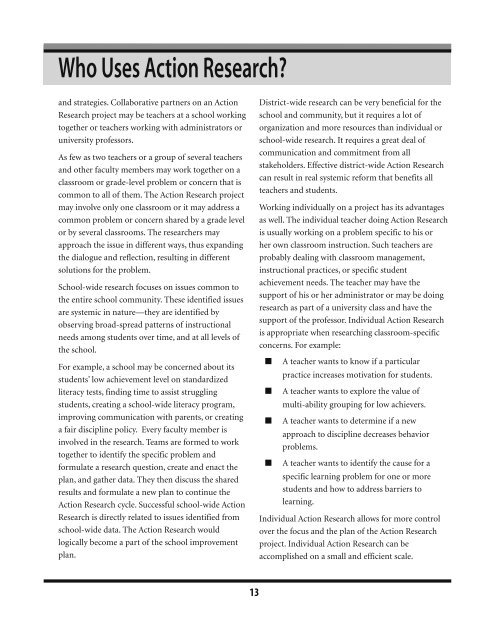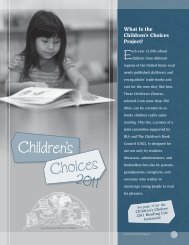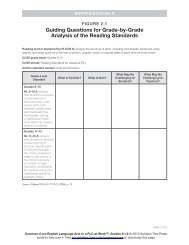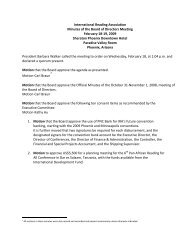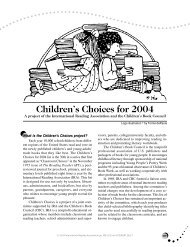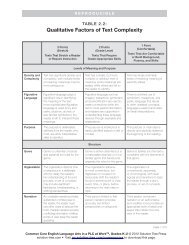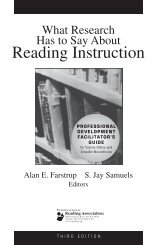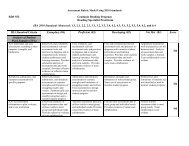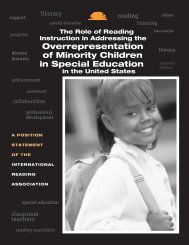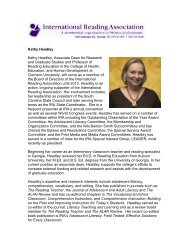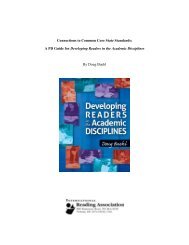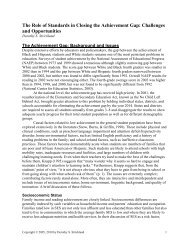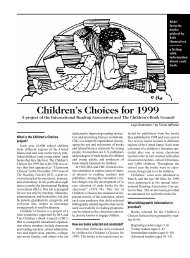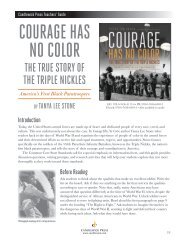A Practical Guide to Action Research for Literacy Educators
A Practical Guide to Action Research for Literacy Educators
A Practical Guide to Action Research for Literacy Educators
Create successful ePaper yourself
Turn your PDF publications into a flip-book with our unique Google optimized e-Paper software.
Who Uses <strong>Action</strong> <strong>Research</strong>?<br />
and strategies. Collaborative partners on an <strong>Action</strong><br />
<strong>Research</strong> project may be teachers at a school working<br />
<strong>to</strong>gether or teachers working with administra<strong>to</strong>rs or<br />
university professors.<br />
As few as two teachers or a group of several teachers<br />
and other faculty members may work <strong>to</strong>gether on a<br />
classroom or grade-level problem or concern that is<br />
common <strong>to</strong> all of them. The <strong>Action</strong> <strong>Research</strong> project<br />
may involve only one classroom or it may address a<br />
common problem or concern shared by a grade level<br />
or by several classrooms. The researchers may<br />
approach the issue in different ways, thus expanding<br />
the dialogue and reflection, resulting in different<br />
solutions <strong>for</strong> the problem.<br />
School-wide research focuses on issues common <strong>to</strong><br />
the entire school community. These identified issues<br />
are systemic in nature—they are identified by<br />
observing broad-spread patterns of instructional<br />
needs among students over time, and at all levels of<br />
the school.<br />
For example, a school may be concerned about its<br />
students’ low achievement level on standardized<br />
literacy tests, finding time <strong>to</strong> assist struggling<br />
students, creating a school-wide literacy program,<br />
improving communication with parents, or creating<br />
a fair discipline policy. Every faculty member is<br />
involved in the research. Teams are <strong>for</strong>med <strong>to</strong> work<br />
<strong>to</strong>gether <strong>to</strong> identify the specific problem and<br />
<strong>for</strong>mulate a research question, create and enact the<br />
plan, and gather data. They then discuss the shared<br />
results and <strong>for</strong>mulate a new plan <strong>to</strong> continue the<br />
<strong>Action</strong> <strong>Research</strong> cycle. Successful school-wide <strong>Action</strong><br />
<strong>Research</strong> is directly related <strong>to</strong> issues identified from<br />
school-wide data. The <strong>Action</strong> <strong>Research</strong> would<br />
logically become a part of the school improvement<br />
plan.<br />
District-wide research can be very beneficial <strong>for</strong> the<br />
school and community, but it requires a lot of<br />
organization and more resources than individual or<br />
school-wide research. It requires a great deal of<br />
communication and commitment from all<br />
stakeholders. Effective district-wide <strong>Action</strong> <strong>Research</strong><br />
can result in real systemic re<strong>for</strong>m that benefits all<br />
teachers and students.<br />
Working individually on a project has its advantages<br />
as well. The individual teacher doing <strong>Action</strong> <strong>Research</strong><br />
is usually working on a problem specific <strong>to</strong> his or<br />
her own classroom instruction. Such teachers are<br />
probably dealing with classroom management,<br />
instructional practices, or specific student<br />
achievement needs. The teacher may have the<br />
support of his or her administra<strong>to</strong>r or may be doing<br />
research as part of a university class and have the<br />
support of the professor. Individual <strong>Action</strong> <strong>Research</strong><br />
is appropriate when researching classroom-specific<br />
concerns. For example:<br />
■<br />
■<br />
■<br />
■<br />
A teacher wants <strong>to</strong> know if a particular<br />
practice increases motivation <strong>for</strong> students.<br />
A teacher wants <strong>to</strong> explore the value of<br />
multi-ability grouping <strong>for</strong> low achievers.<br />
A teacher wants <strong>to</strong> determine if a new<br />
approach <strong>to</strong> discipline decreases behavior<br />
problems.<br />
A teacher wants <strong>to</strong> identify the cause <strong>for</strong> a<br />
specific learning problem <strong>for</strong> one or more<br />
students and how <strong>to</strong> address barriers <strong>to</strong><br />
learning.<br />
Individual <strong>Action</strong> <strong>Research</strong> allows <strong>for</strong> more control<br />
over the focus and the plan of the <strong>Action</strong> <strong>Research</strong><br />
project. Individual <strong>Action</strong> <strong>Research</strong> can be<br />
accomplished on a small and efficient scale.<br />
13


